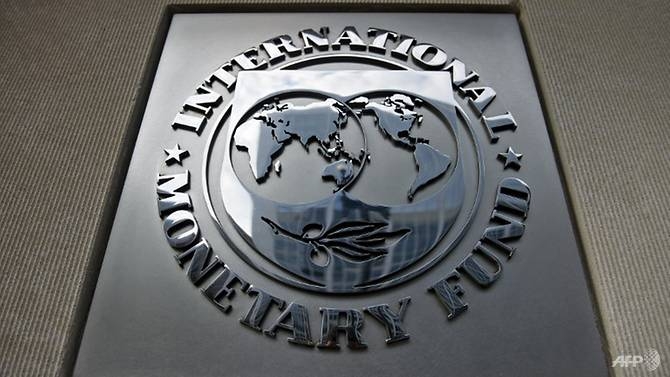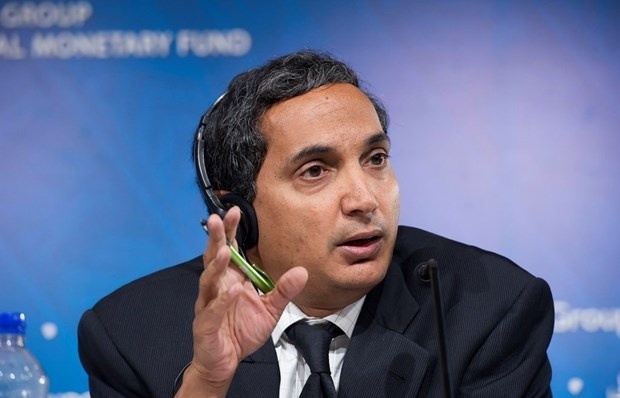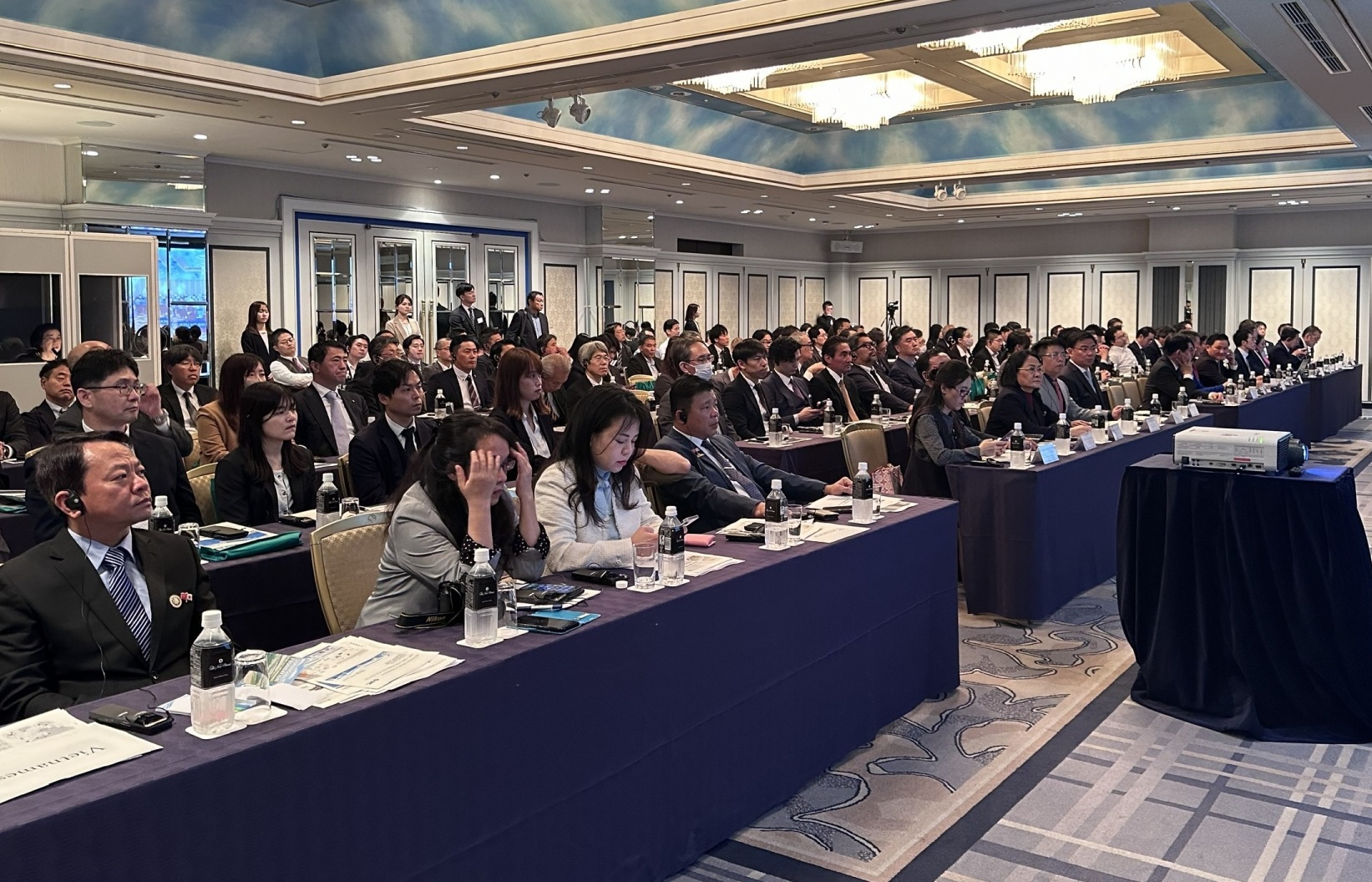IMF warns excess trade surpluses aggravate tensions
 |
| A logo is seen outside the headquarters of the International Monetary Fund in Washington, DC. (AFP/Brendan Smialowski) |
But in a message that seemed directed largely at US President Donald Trump, the IMF once again warned against using protectionist trade measures, calling this a "slippery slope" that could harm growth without resolving the problem.
In addition, Trump's own policies are driving some of the issues he has complained about: US fiscal stimulus - like the massive tax cut approved in December - "is leading to a tightening in monetary conditions, a stronger US dollar and a larger US current account deficit," the IMF said.
Those are precisely the developments Trump railed against on Twitter last week, breaking with longstanding tradition to chastise the Federal Reserve for raising interest rates, which has caused the dollar to strengthen.
Trump has pursued a multifront trade confrontation with key economies, especially China, but has also singled out Germany, and the European Union in general, for treating the US "unfairly." The tariffs he imposed have angered trading partners and prompted swift retaliation.
He also accused the EU and China of keeping their currencies artificially weak to make their exports more competitive.
Trump hammered his trade approach on Tuesday, declaring on Twitter that border taxes would force economic partners to negotiate.
"Tariffs are the greatest!" he said. However, IMF chief economist Maury Obstfeld said in fact there were factors - including the threats of trade tariffs - that were putting downward pressure on currencies recently.
Obstfeld also told CNBC "there is no evidence of manipulation" by China and he noted the US Treasury "came to the same conclusion" in a report in April on currency manipulation by governments.
And he told reporters earlier he viewed the chances of a currency war among leading economies as "very implausible." Since central banks in the US, EU and China were focusing policy actions on their own economic conditions, they "are not targeting their exchange rates," he said.
PROTECTIONIST IMPULSES ARE 'MISGUIDED'
In its latest External Sector Report, the IMF again urged surplus countries to take steps to boost demand and reduce savings to lower the excess current account imbalance, which is comprised largely of international trade.
The concern is that the persistent surpluses in Germany and China if they continue "could be met with stiff protectionist responses," the report said.
Obstfeld said there was "significant negative potential" for trade conflict to weaken global growth if the continuing threats turned into action and eroded business confidence.
He also called protectionist impulses "misguided" since they could undercut world growth by as much as 0.5 percentage points by 2020 in the worst case scenario, while having "little effect on the imbalances."
The escalating threats and counter-threats already are having an impact on businesses, he warned.
"We're in a position where we're at the top maybe of a slippery slope."
Germany's surplus is "substantially stronger" than justified by the state of the economy, while those in China and South Korea were classified as "moderately stronger," as was that of the European Union.
COULD DO MORE
Obstfeld welcomed Germany's recent efforts to boost spending and China also has recently announced a new stimulus plan.
But he said "there is more they could be doing," including in the case of Germany, boosting public investment, including in projects like broadband.
The report said these countries need "reforms to reduce excess saving, through safety net and pension reforms."
That has been a long-standing recommendation of the IMF and other economists who have urged Germany to spend more and encourage more demand to help with the global recovery.
Germany posted a surplus of eight percent of GDP last year which is in part fuelled by the fact the euro's value has been held down by the weak economic performance in member nations, including Greece, which makes German exports more competitively priced.
In the short term, if the US trade deficit continues to widen from 2.4 per cent of GDP last year - exacerbated by fiscal stimulus and a stronger dollar - it risks "intensifying the US administration's approach to reducing its deficit through trade measures," the report said.
The IMF recommendations included allowing increased immigration into the United States - something Trump strongly opposes - to help economic growth.
What the stars mean:
★ Poor ★ ★ Promising ★★★ Good ★★★★ Very good ★★★★★ Exceptional
Related Contents
Latest News
More News
- Crucial small business arena to receive reduced CIT boost (April 24, 2024 | 11:12)
- Gaw Capital bets on “China plus one” opportunities in Vietnam (April 24, 2024 | 09:00)
- Softening demand to limit 2024 trade (April 24, 2024 | 08:00)
- FPT partners with NVIDIA to shape the future of AI and Cloud on global scale (April 23, 2024 | 18:07)
- Beverage giant SABECO thirsty for $190 million profit this year (April 23, 2024 | 17:47)
- US government hosts AI workshop in Ho Chi Minh City with key partners (April 23, 2024 | 15:09)
- FPT sees strong growth in first quarter (April 23, 2024 | 14:49)
- Female influence still to be attained (April 23, 2024 | 10:59)
- Vietnamese plastic firms to cash in on global demand (April 23, 2024 | 09:00)
- E-records in health not yet up to scratch (April 22, 2024 | 09:28)



 Tag:
Tag:

















 Mobile Version
Mobile Version